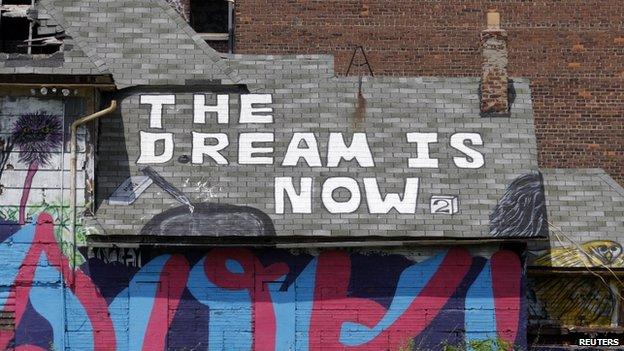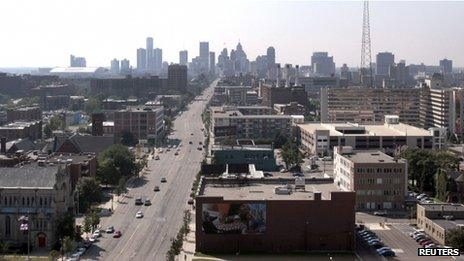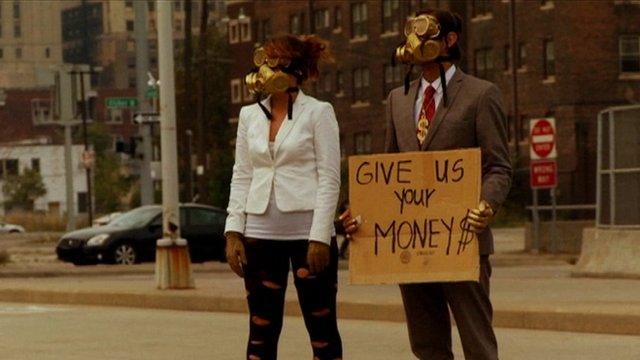Will the real Detroit city please get up off its knees?
- Published

People left Detroit gradually, but those who are left behind vow that it will rise again
Motor City seems to be whatever admirers and detractors, doomsayers and revival gurus, business saviours and late night comedians want it to be.
Long, long ago it was the archetypal American city, a place of astonishing industry and wealth, of energy and diversity, the birthplace of mass manufacturing, a northern refuge for southern blacks to come and join America's prosperous middle class.
As the factories left, and the middle class fled, and crime rocketed and the urban fabric fell into terrible disrepair, it became a byword for urban failure, for the misdeeds of one-party Democratic rule, for the corruption of big unions cosying up to old-style city government.
And on Friday? Well, Michigan State Governor Rick Snyder and the city's Emergency Manager Kevyn Orr appeared to be proclaiming "Detroit: New Dawn" in the wake of the bankruptcy filing earlier in the week.
Enough is enough, said Governor Snyder. The downward spiral had to end. Services, he said, were unacceptable.
Mr Orr, a bankruptcy lawyer who has had the good fortune to spend his career struggling with things other than Detroit's decline, seemed mystified as to how anyone involved in the government of Detroit could have allowed the city to fall so far.
Outrage over his appointment, he wondered? Where was the outrage over the state of the city 10, 20 years ago?
"Does anybody think it's OK to have 40-year-old trees growing through the roofs of dilapidated houses?," he asked.
There are 78,000 abandoned properties in Detroit.
"Does anyone think our children should walk through the dark streets home from school at night in October?"
40% of the city's street lights don't work.
"Does anybody think that they should call the police and not be able to come one time because they are already out on call?"
Detroit police response times are five times the national average.
Thump, thump, thump came the rhetorical questions, sounding suspiciously like a mallet hitting nails into the lid of a coffin. This. Cannot. Go. On.
Out in the city, life went on as if pretty much nothing had happened.
The grand boulevards carried, as always, little traffic. Beggars and half-crazies wandered the sidewalks. Downtown - gleaming and revived - bustled with its newfound buzz. And the rest of the sprawling degraded city, square mile after square mile of it, baked in the heat.
In the city's south-west, a bus rattled its way around the streets.
The fan in the front of the bus buzzed away. The Youth Transportation Pilot, a charitable programme that moves children safely around a none-too-safe city, didn't run to air conditioning.
Feisty attitudes
Outside the windows, nice houses, run-down houses, abandoned houses, burnt-out houses, burnt-out piles of rubble, waist-high weeds, chest-high grass, litter-strewn wasteland. The object of Kevyn Orr's astonishment.
"How did it get like this?" I asked Cassandra Montgomery, a retired city employee who now runs a community services programme.
A pause.
"I don't know," she says, haltingly. "Slowly - but surely - people began to leave the city."
That cut to the quick of the problem.
And then, remembering the endless jokes and slurs the city has suffered, she bridles.

Street lights have been failing in a once busy city
"But no matter where I go, when people ask me where I'm from, I'm from Detroit."
"There's a lot of good hard working people in Detroit. And they don't deserve some of the reputation that they get."
At the front of the hot bus the conductor, Gene Evans, new to the job, kept order as the children came on.
"It's no surprise," he says of the bankruptcy. "It's sad, very sad."
But he says, better times will come.
"People will put in more effort," he says. "They'll look at the city in a different light. Things will change. It will be the great city it used to be." Really? A great city?
"I think it can be. I think it can be. I'm a Detroiter," he smiles, "So I got hope for it."
There's a lot of that attitude around this feisty American town.
It's worth remembering, in amongst the ruins, that the story of Detroit was once the story of America. Only the brave or the foolish would count this city out, quite yet. Will the real Detroit city please get up off its knees?
- Published23 February 2012
- Published23 December 2011
- Published13 September 2012
